
Freshwater Crayfish
metrics 2024
Fostering Insights into Crayfish Behavior and Ecology
Introduction
Freshwater Crayfish, published by the International Association of Astacology, is a peer-reviewed journal dedicated to the comprehensive study of freshwater crayfish, encompassing their ecology, behavior, conservation, and management. With an ISSN of 2076-4324 and an E-ISSN of 2076-4332, this journal serves as an essential platform for researchers, professionals, and students in aquatic science, particularly within the fields of Ecology, Evolution, Behavior and Systematics and Aquatic Science, where it ranks notably in Scopus rankings. The journal has a consistent publication history since 2008, enhancing its relevance and contribution to the scientific community. While it operates under an open-access model, allowing for wide dissemination of research findings, it is particularly noted for its significant impact on advancing knowledge in the preservation and sustainable management of crayfish species. This makes Freshwater Crayfish a vital resource for those passionate about aquatic biodiversity and conservation.
Metrics 2024
 -
- 0.80
0.80 1.10
1.10 -
-Metrics History
Rank 2024
Scopus
IF (Web Of Science)
JCI (Web Of Science)
Quartile History
Similar Journals

ZOOLOGICHESKY ZHURNAL
Fostering a deeper understanding of life’s diversity and evolution.Zoologichesky Zhurnal, a prominent journal in the field of Ecology, Evolution, Behavior and Systematics, has been a vital publication since its inception in 1950. Published by MAIK Nauka-Interperiodica in the Russian Federation, this journal has established a notable reputation in disseminating scientific research and advancing knowledge in zoology. With its coverage spanning from 1950 to 2023, and a specific convergent focus during 1982-1983, this journal contributes significantly to the ecological and evolutionary sciences, even though it currently holds a Q4 classification in the 2023 category quartiles, indicating its niche positioning among peers. Researchers and students engaged in the study of biological sciences, particularly those interested in the dynamics of ecosystems, behavior of species, and evolutionary processes, will find valuable insights and original research articles within its pages. While access to this esteemed journal is not open, it remains an essential resource for those seeking to deepen their understanding of zoological sciences.

RAFFLES BULLETIN OF ZOOLOGY
Fostering Interdisciplinary Collaboration for a Sustainable FutureRaffles Bulletin of Zoology, published by the National University of Singapore's Lee Kong Chian Natural History Museum, serves as a prestigious platform for the dissemination of cutting-edge research in Animal Science and Zoology, as well as Ecology, Evolution, Behavior and Systematics. With a current impact factor reflective of its Q2 category in both fields, this journal not only enhances its visibility in the academic community but also provides valuable insights into the complexities of biodiversity and conservation efforts. Covering a wide array of topics, Raffles Bulletin facilitates interdisciplinary collaboration and serves as an essential resource for researchers, professionals, and students alike. It is indexed in Scopus, ranking #233 out of 490 in Animal Science and Zoology and #406 out of 721 in Ecology, ensuring that the research published contributes significantly to the global discourse on wildlife and ecosystem management. Since its inception in 1996, this journal has bridged gaps in knowledge and continues to foster a deeper understanding of the living world.
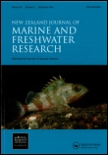
NEW ZEALAND JOURNAL OF MARINE AND FRESHWATER RESEARCH
Fostering Insights into Biodiversity and ConservationNEW ZEALAND JOURNAL OF MARINE AND FRESHWATER RESEARCH, published by Taylor & Francis Ltd, stands as a distinguished platform for the dissemination of innovative research in the realms of aquatic science and ecology. With an ISSN of 0028-8330 and E-ISSN 1175-8805, this journal has been curating significant scientific contributions since its inception in 1967, continuing through to 2024. Recognized in the Q2 category across multiple relevant fields—including Aquatic Science, Ecology, and Water Science—this journal ranks notably in Scopus, with a 74th percentile for Ecology, Evolution, Behavior and Systematics, highlighting its impact and relevance within the scientific community. Though not an open-access publication, its rigorous peer-reviewed articles offer insights that resonate with researchers, professionals, and students who are passionate about advancing our understanding of freshwater and marine ecosystems. By fostering a collaborative space for ecological and environmental inquiries, the NEW ZEALAND JOURNAL OF MARINE AND FRESHWATER RESEARCH is essential for those aiming to contribute to the vital conversations around biodiversity, conservation, and sustainable management of aquatic resources.
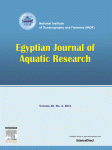
Egyptian Journal of Aquatic Research
Advancing aquatic science for a sustainable future.Welcome to the Egyptian Journal of Aquatic Research, a premier peer-reviewed academic journal published by ELSEVIER, dedicated to advancing the field of aquatic sciences. With a robust impact factor and recognition as a Q1 journal in key categories such as Aquatic Science and Ecology, this open access journal has established itself as a vital platform for disseminating high-quality research since its inception in 2012. The journal aims to provide comprehensive coverage of topics including ecology, evolutionary biology, and water science, making it a crucial resource for researchers, professionals, and students engaged in these dynamic fields. With Scopus rankings placing it in the top echelons of various categories, the Egyptian Journal of Aquatic Research fosters innovation, collaboration, and knowledge dissemination on a global scale, making it an indispensable asset for anyone invested in understanding and preserving aquatic systems.
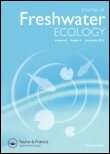
JOURNAL OF FRESHWATER ECOLOGY
Illuminating the pathways of freshwater ecosystem health.JOURNAL OF FRESHWATER ECOLOGY, published by Taylor & Francis Inc, is an esteemed source of research dedicated to advancing the understanding of freshwater ecosystems. Established in 1981, this Open Access journal has provided a platform for innovative studies and groundbreaking articles relevant to the fields of Aquatic Science and Ecology. With its HIndex reflecting a commitment to quality scholarship, the journal is currently classified in the Q3 category for both Aquatic Science and Ecology, Evolution, Behavior and Systematics, indicating its respectable impact within these disciplines. The journal ranks within the 45th percentile in Ecology and the 41st percentile in Aquatic Science on Scopus, highlighting its relevance to a global audience of researchers and practitioners. By facilitating unrestricted access to research findings since 2017, JOURNAL OF FRESHWATER ECOLOGY aims to enrich our understanding of freshwater systems and their conservation, making it an essential resource for those invested in ecological research and environmental sustainability.
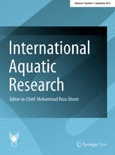
International Aquatic Research
Connecting researchers to the pulse of aquatic ecosystems.International Aquatic Research, published by the Islamic Azad University, Tonekabon Branch, is a vital open-access journal dedicated to advancing the field of aquatic sciences since its inception in 2009. With an ISSN of 2008-4935 and an E-ISSN of 2008-6970, the journal plays a significant role in disseminating high-quality research findings from Iran and around the globe. It covers a broad range of topics in aquatic biology, fisheries science, and marine ecology, making it a valuable resource for researchers, professionals, and students alike. As of 2023, it ranks in the third quartile (Q3) of the aquatic science category with a Scopus rank of #138 out of 247 in Agricultural and Biological Sciences, reflecting its growing influence in the field. With a commitment to promoting scientific knowledge and fostering collaboration among aquatic research communities, International Aquatic Research is positioned as an essential platform for those dedicated to understanding and conserving marine and freshwater environments.
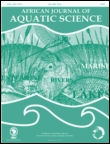
AFRICAN JOURNAL OF AQUATIC SCIENCE
Connecting researchers to the pulse of aquatic ecosystems.AFRICAN JOURNAL OF AQUATIC SCIENCE, published by TAYLOR & FRANCIS LTD, is a premier scholarly journal dedicated to the field of aquatic science, ecology, and environmental management, playing a crucial role in advancing research and knowledge in these vital areas. With an impressive Q2 ranking in both Aquatic Science and Ecology, Evolution, Behavior and Systematics, the journal seeks to publish high-quality research encompassing a wide range of topics related to freshwater and marine ecosystems, including biodiversity, conservation strategies, and the impacts of climate change. Featuring a rich history of publication from 2000 to 2024, the journal not only embraces rigorous peer review but also aims to foster collaboration and dialogue among researchers, practitioners, and students interested in aquatic environments. Readers will find that the journal’s commitment to impactful scientific communication is reflected in its notable rankings within the Scopus database, making it an essential resource for those engaged in aquatic research and management.

ENVIRONMENTAL BIOLOGY OF FISHES
Pioneering studies that shape the future of aquatic science.ENVIRONMENTAL BIOLOGY OF FISHES, published by SPRINGER, is a premier journal in the fields of Aquatic Science and Ecology, Evolution, Behavior and Systematics. With a rich history spanning from 1976 to 2024, this esteemed journal provides a platform for groundbreaking research that addresses critical issues such as fish ecology, species behavior, and environmental influences on aquatic life. Recognized for its significant contributions, it holds a Q2 ranking in both the Aquatic Science and Ecology categories, reflecting its influence and relevancy in the academic community. The journal's focus on innovative ecological studies makes it an essential resource for researchers, professionals, and students dedicated to advancing our understanding of fish biology and the broader ecological systems of which they are a part. Although not an open-access publication, the insights and findings presented in its articles are invaluable for those engaged in the preservation and sustainable management of aquatic environments.

CYBIUM
Advancing knowledge in ichthyology and aquatic sciences.CYBIUM is a reputable journal published by the Société Française d'Ichtyologie, dedicated to advancing research within the fields of Animal Science and Zoology as well as Ecology, Evolution, Behavior and Systematics. With a commitment to fostering scientific dialogue, CYBIUM has been a valuable resource for scholars since its inception in 1996, reporting on a wide array of ichthyological studies and aquatic biology. The journal is recognized in the 2023 Scopus rankings with a notable position in the Q3 quartile for Animal Science and Zoology and Q4 for Ecology, Evolution, Behavior and Systematics, reflecting its growing influence in these disciplines. Although currently not categorized as Open Access, CYBIUM continues to provide essential insights into fish biology and ecology from the heart of France, the Museum national d'Histoire naturelle in Paris. Researchers, professionals, and students in related fields will find CYBIUM an indispensable tool for staying informed about the latest developments and research trends within ichthyology and marine sciences.
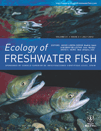
ECOLOGY OF FRESHWATER FISH
Unveiling the intricacies of freshwater habitats.ECOLOGY OF FRESHWATER FISH is a premier academic journal dedicated to advancing the understanding of freshwater fish ecology, published by Wiley in Denmark. With an ISSN of 0906-6691 and an E-ISSN of 1600-0633, the journal has been a critical platform for researchers since its inception in 1992, and will continue through 2024. It holds an impressive Q2 ranking in multiple categories including Aquatic Science and Ecology according to the latest quartiles, reflecting its significance and impact in these fields. The journal is well-regarded with Scopus rankings placing it in the top percentiles for ecology-related disciplines, showcasing its contributions to the understanding of aquatic ecosystems. Although it does not offer open access, the journal is highly valued for its rigorous peer-review process and its commitment to publishing original research that informs policy and conservation efforts. By bridging the gap between theory and practice, ECOLOGY OF FRESHWATER FISH remains a vital resource for students, professionals, and researchers engaged in the study of freshwater environments.